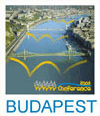
AH2003 is a workshop with sessions proposed at three conferences:
 |
The Twelfth International
World
Wide Web Conference
|

 |
The Fourteenth Conference on
Hypertext and Hypermedia
|
Here are links to the schedules and photos for the Workshop Sessions:
The proceedings are now on-line. Authors can verify their papers before the final printing.
All candidate participants to the workshop (without paper presentation) are invited to submit a short position paper, describing their ongoing research.
The research area of adaptive hypermedia originates from the coming together of the areas of hypertext and hypermedia, user modeling and Web-based information systems, all of which have embraced the topic of adaptation.
Under different names workshops have been organized, mainly at the world Wide Web Conference (1999), the user Modeling Conference (1994, 1996, 1997, 1999, 2001) and the ACM Hypertext Conference (1997, 1998, 2001). The Workshop on Adaptive Hypermedia and Adaptive Web-Based Systems builds on the tradition that was started in 1994 as a workshop on adaptive hypertext and hypermedia at the User Modeling Conference, followed by 1998 at the ACM Hypertext Conference, and organized as a two-session workshop in 2001, at the User Modeling and Hypertext conferences. The 2001 workshop also started a tradition of having a workshop in between the main Adaptive Hypermedia conferences which have been organized in 2000 (Trento, Italy) and 2002 (Malaga, Spain). The adaptive hypermedia community is growing (around 90 in 2000, 180 in 2002) and working actively in preparation of a third full conference in 2004. Adaptive hypermedia researchers are getting together in 2003 to discuss issues and questions that are important in this field. this is be done in a three session workshop, where each session has a different focus.
In 2003 the adaptive hypermedia workshop focuses on adaptation engineering. Each part of the workshop approaches this problem from a different perspective, starting with the enabling technologies for realizing adaptation engineering at WWW 2003, discussing issues with respect to user modelling (as the main driving part of adaptive applications) at UM 2003, and finally presenting various ways of constructing adaptive hypermedia at HyperText 03. The three sessions feature joint proceedings, published on the Web at http://wwwis.win.tue.nl/ah2003/ and also as a TU/e Computer Science Report.
The workshop takes a question-oriented approach. All contributions are required to make an explicit statement, within the abstract, explaining which research question(s) they are addressing. They can approach the questions from different angles: from field observations, from an application area, from a theoretical perspective, from a systems engineering perspective, etc. appropriate research questions are listed in the table below, but contributors are free to suggest (and defend) additional questions.
| Conference | WWW 2003 | UM 2003 | Hypertext 2003 |
|---|---|---|---|
| Key Questions |
|
|
|
Each workshop session consist of the following items:
general chair: Paul De Bra, eindhoven University of Technology.
Each workshop session has a co-chair, who supervises the selection of papers, the session program and who moderates the discussions during the workshop day. The co-chairs are:
Members: A program committee of 15 to 20 people has performed the
selection of papers for all three sessions jointly. the following
people
have already agreed to be on the program committee:
Lora Aroyo (Eindhoven University of Technology)
Peter Brusilovsky (University of Pittsburgh)
Ricardo Conejo (University of Malaga)
Alexandra Cristea (Eindhoven University of Technology)
Fiorella De Rosis (University of Bari)
Serge Garlatti (ENST, Brest)
Franca Garzotto (Politecnico di Milano)
Nicola Henze (Institut für Technische Informatik, Hannover)
Paul Maglio (IBM Almaden Research)
Tanja Mitrovic (University of Canterbury, New Zealand)
Wolfgang Nejdl (University of Hannover)
Vittorio Scarano (University of Salerno)
Daniel Schwabe (Catholic University of Rio de Janeiro)
Barry Smyth (Changingworlds and University College Dublin)
Julita Vassileva (University of Saskatchewan)
Gerhard Weber (Pedagogical University of Freiburg)
Ross Wilkinson (RMIT University, Australia)
All mail regarding this workshop should be sent to Paul De Bra at debra@win.tue.nl. All mail should
include AH2003 in the Subject in order to pass a spam filter. In case
of
problems you can also use the following contact information:
Paul De Bra
Department of Computing Science
Eindhoven University of Technology
PO Box 513
NL 5616 DE Eindhoven
The Netherlands
phone: +31 40 2472733
fax: +31 40 2463992